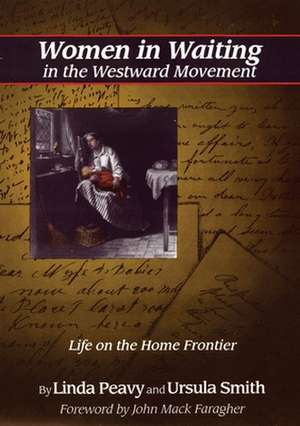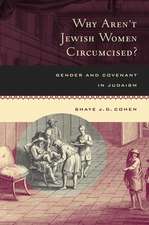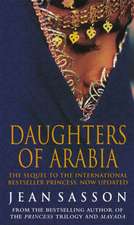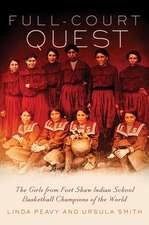Women in Waiting in the Westward Movement: Life on the Home Frontier
Autor Linda Peavy Jack Faragher Ursula Smithen Limba Engleză Paperback – 31 mar 1994
Preț: 206.64 lei
Nou
Puncte Express: 310
Preț estimativ în valută:
39.55€ • 41.13$ • 32.65£
39.55€ • 41.13$ • 32.65£
Carte tipărită la comandă
Livrare economică 12-26 aprilie
Preluare comenzi: 021 569.72.76
Specificații
ISBN-13: 9780806126197
ISBN-10: 0806126191
Pagini: 402
Dimensiuni: 150 x 229 x 24 mm
Greutate: 0.53 kg
Editura: University of Oklahoma Press
ISBN-10: 0806126191
Pagini: 402
Dimensiuni: 150 x 229 x 24 mm
Greutate: 0.53 kg
Editura: University of Oklahoma Press
Textul de pe ultima copertă
During the last half of the nineteenth century, thousands of men went west in search of gold, land, or adventure - leaving their wives to handle family, farm, and business affairs on their own. The experiences of these westering men have long been a part of the lore of the American frontier, but the stories of their wives have rarely been told. Ten years of research into public and private documents - including letters of couples separated during the westward movement - has enabled Linda Peavy and Ursula Smith to tell the forgotten stories of "women in waiting." Though these wives were left more or less in limbo by the departure of their adventuring husbands, they were hardly women in waiting in any other sense. Children had to be fed, clothed, housed, and educated; farms and businesses had to be managed; creditors had to be paid or pacified - and, in some cases, hard-earned butter-and-egg money had to be sent west in response to letters from broke and disillusioned husbands. This raises some unsettling questions: How does the idea of an "allowance" from home square with our long-standing image of the frontiersman as rugged individualist? To what extent was the westward movement supported by the paid and unpaid labor of women back east? And how do we measure the heroics of husbands out west against the heroics of wives back home? Based on the experiences of more than fifty women - from Abiah Hiller, whose business sense equaled or excelled her husband's, to Emma Christie, who knew virtually nothing about the matters she was called upon to manage - Women in Waiting in the Westward Movement offers a rare glimpse into life on the home frontier and provides new insights into fairly common, though poorly documented, aspect of the history of the settling of the American West.













